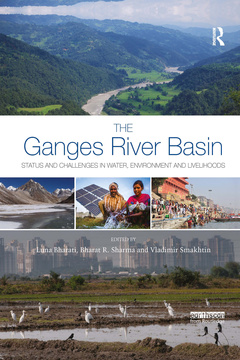The Ganges River Basin Status and Challenges in Water, Environment and Livelihoods Earthscan Series on Major River Basins of the World Series
Coordonnateurs : Bharati Luna, Sharma Bharat R., Smakhtin Vladimir

The Ganges is one of the most complex yet fascinating river systems in the world. The basin is characterized by a high degree of heterogeneity from climatic, hydrological, geomorphological, cultural, environmental and socio-economic perspectives. More than 500 million people are directly or indirectly dependent upon the Ganges River Basin, which spans China, Nepal, India and Bangladesh. While there are many books covering one aspect of the Ganges, ranging from hydrology to cultural significance, this book is unique in presenting a comprehensive inter-disciplinary overview of the key issues and challenges facing the region.
Contributors from the three main riparian nations assess the status and trends of water resources, including the Himalayas, groundwater, pollution, floods, drought and climate change. They describe livelihood systems in the basin, and the social, economic, geopolitical and institutional constraints, including transboundary disputes, to achieving productive, sustainable and equitable water access. Management of the main water-use sectors and their inter-linkages are reviewed, as well as the sustainability and trade-offs in conservation of natural systems and resource development such as for hydropower or agriculture.
Foreword Ravi Chopra Part 1: Resources and Uses 1. Introduction Luna Bharati, Bharat Sharma and Vladimir Smakhtin 2. Surface Water Resources Sharad Kumar Jain, Marc A. Jeuland, Luna Bharati and Zahirul Haque Khan 3. Groundwater Resources Dipankar Saha, Anwar Zahid, Surendra Raj Shreshtha and Paul Pavelic 4. Climate Change and the Ganges Basin Marc A. Jeuland 5. Managing Variability: Floods and Droughts Giriraj Amarnath, A.K.M. Saiful Islam and M. S. Shrestha 6. Agriculture and Water Use: Implications for Sustainable Intensification Bharat Sharma, Alok K. Sikka, Ram Pratap Sah and Xueliang Cai 7. Hydropower: The Status and Challenges Dwarika N. Dhungel, Santa Bahadur Pun, Sonali Mittra and M. Monirul Qader Mirza 8. Water-Food-Energy Nexus: Challenges and Opportunities Christopher A. Scott, Arica Crootof, Bhuwan Thapa and Rashmi Kiran Shreshtha 9. Ganges Water Machine: One Solution to Basin Water Problems? Upali A. Amarasinghe and Lal Mutuwatte Part 2: Environment 10. Environmental Flows: Keeping the Basin Rivers Alive Vladimir Smakhtin and Luna Bharati 11. Ecosystem Services and Conservation Assessment of Freshwater Biodiversity Asghar Nawab, Ravindra Kumar Sinha, Paul M. Thompson and Subodh Sharma 12. Arsenic in the Eastern Ganges Basin: Extent and Impact on Food Chain and Human Health Rajmohan Natarajan, Dipankar Chakraborti and Sanmugam Prathapar 13. Ganges Water Quality: Dirty Past, Promising Future Javier Mateo-Sagasta and Vinod Tare Part 3: Governance and Livelihoods 14. Institutions and Policies Governing Water Resources Management M. Dinesh Kumar, Dwarika N. Dhungel, M. Monirul Qader Mirza and Diana Suhardiman 15. Poverty, Inequalities and Vulnerability of the Rural Poor Upali A. Amarasinghe, Fraser Sugden and Floriane Clement 16. Gender, Agricultural Investment and Productivity in an Era of Out-migration Fraser Sugden, Panchali Saikia, Niki Maskey-Amatya and Paras Pokhrel 17. Can there be Progress on Transboundary Water Cooperation in the Ganges? Mark Giordano, Dipak Gyawali, Ainun Nishat and Uttam Kumar Sinha 18. Basin Water Challenges: An Agenda for Accelerated Reform Tushaar Shah, Prachanda Pradhan and Golam Rasul
Luna Bharati is a Senior Researcher and the Head of the Nepal Program at the International Water Management Institute (IWMI).
Bharat R. Sharma is Scientist Emeritus (Water Resources) at IWMI, based in New Delhi, India.
Vladimir Smakhtin was Head of the Water Availability, Risk and Resilience Research Department at IWMI, Colombo, Sri Lanka. He is now the Director of the Institute for Water, Environment and Health (UNU-INWEH), based in Hamilton, Ontario, Canada.
Date de parution : 12-2020
17.4x24.6 cm
Date de parution : 08-2016
17.4x24.6 cm
Thèmes de The Ganges River Basin :
Mots-clés :
Ganges Basin; GRB; riparian; Nepal Terai; countries; Riparian Countries; west; Hydropower Development; bengal; NEA; gangetic; Groundwater Depletion; plains; Gangetic Plains; joint; West Bengal; rivers; Average Hydrological Year; commission; BCM; hydropower; WEF Nexus; WHH; BARC; Energy Recovery; Arsenic Concentration; IIT Roorkee; Arsenic Contamination; EFA Method; Arsenic Content; St Ag; EFA; Energy Policies; Water Energy Food Nexus; Hydropower Projects



